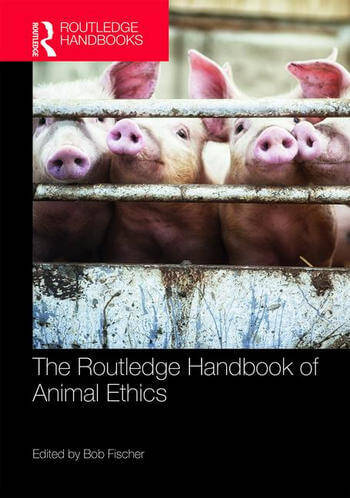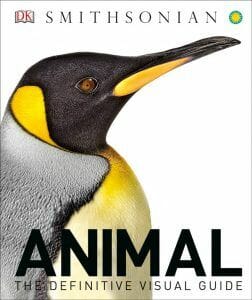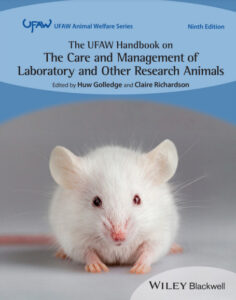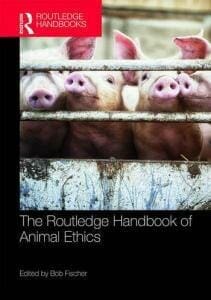Introduction Bob Fischer
Part I: Thinking about Animals
1. Psychological Mechanisms Involved in Human– Animal Interactions: How Do Humans Cognize About Animals
Catherine Amiot and Brock Bastian
2. Understanding the Moral Implications of Morgan’s Canon Maria Botero
3. Animal Intelligence John Pearce
4. The Emotional Lives of Animals Tina Horback
5. Animal Self-Awareness: Types, Distribution, and Ethical Significance David DeGrazia
6. The Moral Animal Mark Rowlands
7. Quantifying Animal Well-Being and Overcoming the Challenge of Interspecies Comparisons Mark Budolfson and Dean Spears
8. Cost-Effectiveness in Animal Health: An Ethical Analysis Govind Persad
Part II: Animal Agriculture and Hunting
9. The Origins of Factory Farming in the United States: An Overview James McWilliams
10. The Economics of Intensive Animal Agriculture F. Bailey Norwood
11. Animal Welfare—Is Intensification the Problem? Joy Mench
12. Intensive Animal Agriculture and the Environment Lisa Kemmerer
13. Intensive Animal Agriculture and Human Health Jonathan Anomaly
14. Seafood Ethics: Reconciling Human Well-being with Fish Welfare Mimi Elizabeth Lam
15. Small-Scale Animal Agriculture Donald Bruckner
16. Subsistence Hunting Raymond Anthony and Gary Varner
Part III: Animal Research and Genetic Engineering
17. Institutionalized Ethical Assessments of Animal Experiments Bernice Bovenkerk and Lonneke Poort
18. Animal Models: Problems and Prospects Pandora Pound
19. Applied Ethics in Animal Experimentation Larry Carbone
20. Genetic Engineering of Nonhuman Animals Adam Shriver
21. Building Ethical De-extinction Programs: Considerations of Animal Welfare in Genetic Rescue Ben Novak
Part IV: Companion Animals
22. From Pets to Companion Animals: A History Katherine Grier
23. The Ethics of Domestication Jessica du Toit
24. The Ethics of Keeping Pets Jessica Pierce
25. The Ethics of Companion Animal Euthanasia Christine Overall
26. Links Between Violence Against Humans and Nonhuman Animals: Examining the Role of Adverse Family Environments Shelby Elaine McDonald
Part V: Wild Animals: Conservation, Management, and Ethics
27. Zoos and Aquariums Committing to Integrated Species Conservation Mark Gusset
28. The Educational Value of Zoos: An Empirical Perspective Nancy Staus
29. Moral Arguments Against Zoos Karen S. Emmerman
30. Defensible Zoos and Aquariums Clare Palmer, Hamish Morrin, and Peter Sandøe
31. Killing for conservation: Ethical considerations for controlling wild animals Sara Dubois
32. Ethical dimensions of invasive animal management Tim S. Doherty and James C. Russell
33. Property, Regulation, and Endangered Species Conservation Steven McMullen
34. The Laissez-Faire View: Why We’re Not Normally Required to Assist Wild Animals Clare Palmer
35. Welfare Biology Catia Faria and Oscar Horta
36. Wild Animals as Political Subjects John Hadley
Part VI: Animal Activism
37. The History of Animal Activism: Intersectional Advocacy and the American Humane Movement Janet M. Davis
38. The Political and Cultural Sociology of Animal Advocacy Erin M. Evans
39. Beyond Compare: Intersectionality and Interspecieism for Co-Liberation with Other Animals Nekeisha Alayna Alexis
40. Political Lobbying for Animals Joanna Grossman
41. Effective Animal Advocacy Jeff Sebo
42. Cultured Meat: A New Story for the Future of Food Max Elder
43. Veganism, (Almost) Harm-Free Animal Flesh, and Nonmaleficence: Navigating dietary ethics in an unjust world Cheryl Abbate
44. Animal Sanctuaries Elan Abrell














![Ettinger’s Textbook of Veterinary Internal Medicine 9th Edition [PDF+Videos] Ettinger’s Textbook of Veterinary Internal Medicine 9th Edition [True PDF+Videos]](https://www.vet-ebooks.com/wp-content/uploads/2024/10/ettingers-textbook-of-veterinary-internal-medicine-9th-edition-100x70.jpg)

![Textbook of Veterinary Diagnostic Radiology 8th Edition [PDF+Videos+Quizzes] Thrall’s Textbook of Veterinary Diagnostic Radiology, 8th edition PDF](https://www.vet-ebooks.com/wp-content/uploads/2019/09/textbook-of-veterinary-diagnostic-radiology-8th-edition-100x70.jpg)






